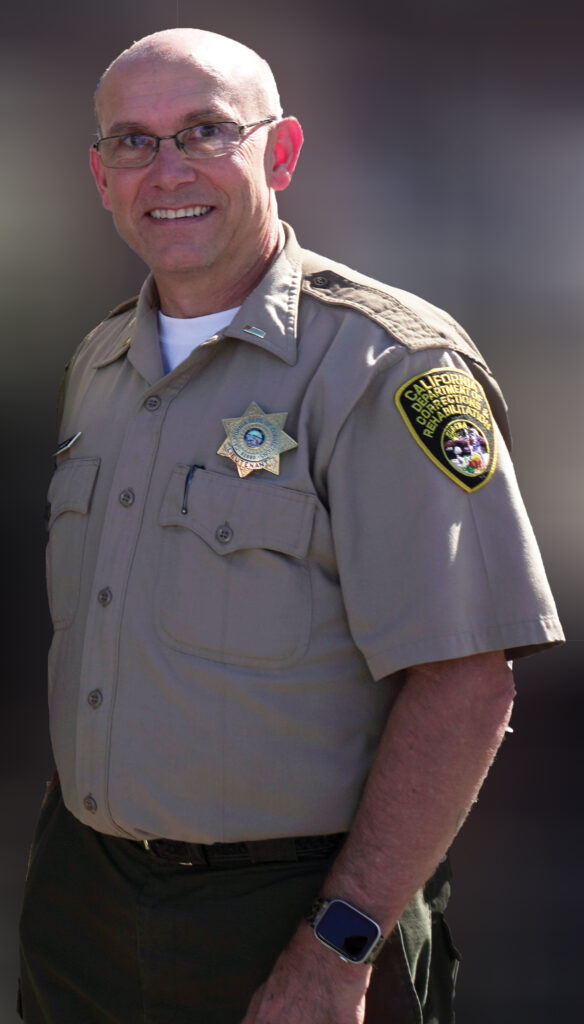
To help put into effect Gov. Gavin Newsom’s new reimagined concept for San Quentin, the prison’s top administrators appointed the best leader for the task of retraining a core group of officers — an essential component to making relationships between staff and the residents work.
“The goal is to get [residents] with the most problems to gain the trust of staff,” said Lieutenant B. Haub, the highly qualified officer to lead the charge. “We have to show [the residents] that we are here to help and not treat them like caged animals. We have to show them that we are not here to hurt anyone.”
Standing at the podium, the relaxed Lt. Haub enjoyed a morning meal with his staff. Known by those around him for his easygoing and approachable nature, complemented by a poised persona, he calmly answered questions from residents — a typical day in the Earned Living Unit, or ELU, which he now oversees in South Block.
His promotion to sergeant took place when the prison had a reception center and he later rose to lieutenant in West Block. Haub also ran a successful program in the prison’s H-Unit.
Lt. Haub and the group he trained at San Quentin will trail blaze a path for other staff members to follow. In his training, he taught empathetic approaches when dealing with incarcerated persons — from ordinary, daily encounters to mental health issues.
To speak to his character, Lt. Haub said, “I am loyal and trustworthy.” He highlighted his 30 years of faithful marriage to the same woman and raising his three children. He modestly declined to speak of all the good character traits he possesses.
Lt. G. Berry did not hesitate to highlight Haub’s remarkable accolades. “He is a fair person who helps people with their issues,” she said. “He is a mentor who gives great advice and is consistent in what he does.” Lt. Berry, one of the many officers trained by Lt. Haub, worked for him in one of the roughest parts of the prison.
While overseeing Badger Section, one of the more challenging parts of the prison, Lt. Haub said he had to deal with fights and stabbings every day.
“There were validated gang members and it was constantly active,” he said. Having a balance in the way he used his judgment, Lt. Haub’s keen discernment helped.
“He knows that right is right and wrong is wrong,” said Berry. In regard to the future for all residents and staff of the prison, and most importantly, reshaping the mindsets of all stakeholders, Lt. Berry said he realized the significance of the concept.
“It is important for staff and the resident population to have good relations. He is a solid dude,” Lt. Berry said, adding, “We chose a good person to coordinate Donner Section, the Earned Living Unit program.”
Any Donner resident who receives a disciplinary write-up must leave the ELU. The residents must remain very respectful and the ELU tolerates no racial division. “We are all human,” said Lt. Haub.
“I have been in the ELU with Lt. Haub for about a year,” said resident Darrell Davis. “Ever since I’ve met him, he always has been fair and approachable. He treats you like a human. He is honest.” As for the training, Davis said, “His training will open up doors for other officers to start believing in this new model at the prison. [They will believe it] because of the character he displays.”
The veteran lieutenant has spent decades in the system. He has firsthand experience in transforming and reshaping incarcerated places from bad to good. He ran successful programs in many parts of the prison, using his characteristic fairness to achieve turnarounds.
“I talk to at least 10 residents a day about personal problems or problems with other personnel or staff,” Lt. Haub said. “I have had guys come into my office because I also do appeals and RVR hearings for all kinds of reasons.” Lt. Berry said she considers Lt. Haub similar to a counselor, a psychologist, and a conflict manager, all combined in one person.
Fairly balancing the opinions of residents and staff sometimes does not happen easily. Lt. Haub does not allow naysayers and anyone not ready to accept the new model of the prison to deter him from leading the way toward change.
“There is some staff disagreement, and likewise, some [residents] who do not want to change,” Lt. Haub said, “but, 90% of residents are paroling so we want to make it more normal. Residents who are better equipped to parole make communities better. So, as we get over each hurdle, it will get better and better and we’ll get through it.”
As for those officers and residents who refuse to adjust to the new model for the prison, they will have other options.
“Other officers will get on board or transfer or retire,” said Lt. Haub, “because officers [and residents] here are adapting to the California Model.”
The elimination of Death Row and the building of a high tech education center count among the biggest changes at San Quentin. “The new Education Center will include a coffee shop, restaurant, and a grocery store. I will have a cup of coffee in the morning with residents and then go to work,” Lt. Haub said. “The goal is to get more normalization for residents, so they are better equipped to reenter society.”
Lt. Haub spoke with hope to a future day on which he might have a formerly incarcerated person as a neighbor, a person fully rehabilitated, a person deemed responsible, and a person considered respected and trustworthy.